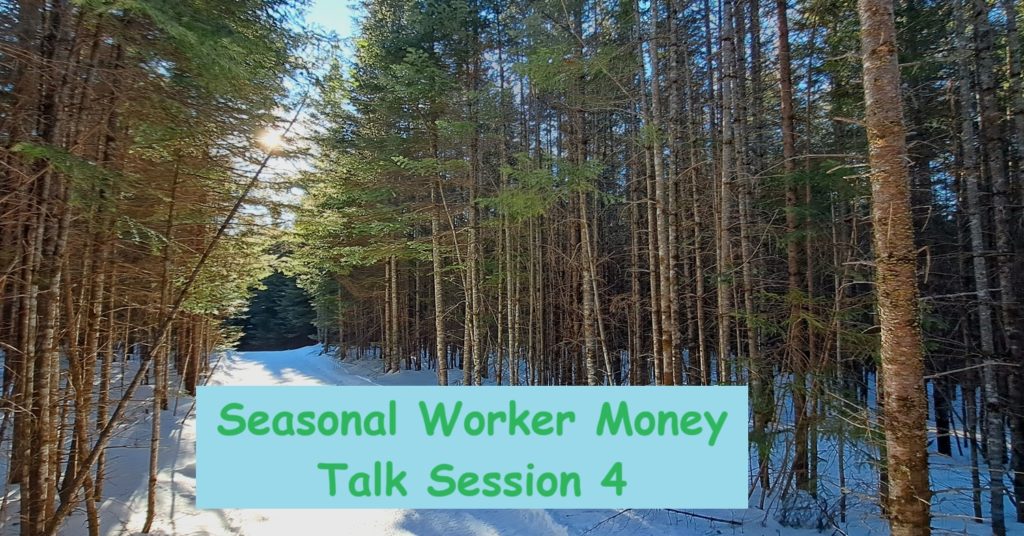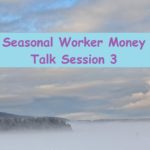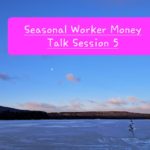Seasonal Worker Money Talk Session 4
Seasonal Worker Money Talk Session 4
We’re all doing so great! The conversations and ways people have been talking about money are so inspiring.

Someone said something last week that got me and Chris to pause. It was something to the effect of ‘Well how much do I budget for toothpaste?’
I wanted to take a moment to differentiate two things:
Needs and Wants
It is so wonderful how much people are thinking more deeply about the money choices. Life takes money. Mark Twain famously quoted the only sure things in life are death and taxes.
Some of are reading the book by Ramit I Will Teach You to Be Rich. I wasn’t sure how I would react to that book (for a long time titles like that were almost a turn off or I felt uncomfortable by such a title in the early in the days. I thought who am I to think I could ever be financially stable?)
What I like about the book is his use of the term conscious spending. Ramit is all about living fiscally responsibly. We know it will cost money to live – so take care of that and then set money aside for guilt-free spending. Live a life that is full for you.
Living on a strict budget can be a short-term thing.
When I first started I used to think budgets, living, or being a conscious spender meant saving every penny.
Instead, I learned the message from many (like JL Collins or Ramit) was:
Create a life where you spend money on the things that matter to you.
Money is a tool.
Just like an ax is a tool – if we learn how to sharpen it – we can use it well and get through the tasks of life much easier than if we hack away at life tasks with a dull ax.
Chris and I have been debt free for around 15 years. Rooted deep in American culture is normalizing having debt…which is why so many people have a hard time conceptualizing how it’s even possible we can live the way we do.
If you can keep expenses low and rid yourself of debt (in many instances) – the world is your oyster.
When we first graduated college we had around $20,000 debt. We knew we wanted to get rid of that as soon as possible. Our goal was to move to New Zealand on the working holiday visa.
This was the time in our life when we slept on a blow-up mattress on the floor. We ate a lot of pasta. Cardboard boxes turned upside down with pretty tapestries were our end tables. Our monthly loan payments we always sent in more money than the minimum.
We still did some trips and fun things. The things we did (like walk to the grocery store instead of drive) did not feel like sacrifices to us.
Our eyes saw this as short-term control for long-term gain.
It paid off. We became completely debt-free and bought one-way tickets to New Zealand.
From there we were able to start our long-term wealth accumulation.
We did not really know what we were doing. At first this just looked like save lots of money in our savings account with ~1% interest. Our thresholds got bigger every year growing from $5,000 to $10,000 and then upwards from there. We just knew we always wanted enough money to cover our living expenses for a year or more.
At a certain point we realized we could go for years and not work if we didn’t want to. This was when we thought, hmm, we might be able to learn more about how to handle our money. We had become very good at saving. There was a slow switch from being good saving to learning how to make that hard earned savings work for us.
I could say more, but for the moment where we are at in these classes, the words I feel inclined to say are:
If you are starting out on creating long-term financial stability for yourself, the idea isn’t to suffer and have to count every penny the rest of your life.
The idea is to get these beneficial habits down as early as you can in life.
If you don’t have a large savings built up – do that. The skills you will master if you can save a year’s worth of your expenses will carry you the remaining decades of your life.
I sometimes wonder if one of the best things we did early on was our Americorps job where we earned a stipend of $4.25/hr. At that low of a wage, learning how to live frugally was the only option. The habits that were instilled in us set us on a trajectory that has now given us so much freedom.
As you figure out and decide the fun things – it’s more a matter of deciding: these are the areas in my life that I find value in. That is where you can put your first most precious resource (time) and one of your other resources (money) towards.
Ok.
Rapid Fire Questions:
How do I know when I can buy myself something nice just because?
When you have allotted or saved money to do this without impacting the general wellness of your life.
If you are going to make a larger purchase – but then – you stay awake at night because you are stressed out about how much less money you have in your savings account or you can’t pay the balance on your credit card – then you probably are NOT in a position to buy yourself something nice.
If you can make this purchase and you don’t notice a hit to your week-to-week monetary expenditures and you can still pay your bills and not winch – then you probably are IN a position to buy yourself something nice.
IMPORTANT: It does not mean to not ever buy yourself something nice!!! However, if you have, for whatever reason, a whole mess of debt or high-interest payments, take care of business first. Because if you can be disciplined enough to do that…then you can afford to buy yourself many nice things “just because” in the upcoming stage of life.
What about when I’m traveling or someplace where there is a once-in-a-lifetime experience?
Remember how we spent most of the first two sessions talking about emotions? And budgets? Marketing will prey upon your emotions any place, any time, any situation if you are not ready to be aware of that.
When we were in Queensland, New Zealand I remember we both felt like there were so many unique adventure experiences we could do. We could have spent $3000+ in days. At that time we were still younger and had not yet built up the savings we have now.
Our emotions can run wild when we get to places – even if that is downtown where we live.
It’s the only time best friend will get married or I might never be at Mardi Gras again.
We usually deal with these emotions by:
Having a rough idea what we want to do (ie, go on a hot air balloon ride say maybe bar hope for wedding party.)
It’s nice to have some buffer money to the amount that makes sense in case something else comes up that you really want to do. Often $1,000-$1,500 is enough “extra” for surprise things we feel strongly about wanting to experience.
That was when we were younger.
Now if there is something we want to do – we can just do it. We built the financial discipline and mental discipline to decide on the value we think we will get from the experience and then act accordingly.
Know wherever you are someone, even if it’s a TV advertisement or a billboard, will try to take control of your emotions, your mind, and your money. So – you are better off handling that yourself!
How to Plan for the Long Term – it feels so far away. There are so many things I want to do now that require money.
As I was typing that line I thought it was kind of ironic because when I started these habits I wasn’t planning for the long term – I was planning for next week!
But I totally felt that (and can still feel that.) When you are in your 20s “retirement” is decades away.
A term I learned about later in life, that would have helped me younger in life was to be aware of:
All or Nothing Thinking
I used to think I’d just have to save a lot to make a difference. If I wasn’t maxing out the whole ROTH for a year as a young 20 year old what was the point. Oh what a fixed mindset I had.
Do what you can when you can and never underestimate yourself or the value of $5.
I grew up where money was always such a struggle and a continuous source of stress, anxiety, and fighting. We were poor, although now I also understand we were poor with our habits. We had lots of stuff too. Shopping was something we used to do for fun! What do you want to do this Saturday? Go to the mall! I barf now thinking this is how so many of us get raised as young kids thinking this is an activity. And then we sit here and wonder why as adults we have so much trouble managing our money.
Coming from a family that didn’t have a lot of money put in me the fear that I better be able to take care of myself. So I had a lot of motivation to be a saver. Kristy Shen talks about the scarcity mindset in her book Quit Like A Millionaire which is also a great book to read!
It also breaks my heart to see people who are 70 or 80 years old and stress about money. To have gone that long through life, worked that much, and yet still, to worry about money.
I think it’s possible to set ourselves up for financial success, both now and later. It might be to our benefit to make some sacrifices in the early stages, but my gosh, that will pay off.
Every healthy habit you have is an investment in yourself. Life is going to throw curve balls. You just know you can expect that. So having some control over money (and eliminating or at least greatly reducing that stress) is within our control.
To answer the question:
Cover your basics now and put at least $5 a week towards long-term saving or investing.
Have a growth mindset and continuously evolving goals for yourself.
Put something towards long-term investing. It can be $15!!! DO NOT underestimate the compounding effect of small choices done over and over again.
Could go on and on about this. Read James Clear’s book Atomic Habits.
How do I not have yo-yo spending? I go for a while and spend almost nothing – so then I tell myself since I spent so little last month I can spend more this month!? Ah!? Help!
Mm-hmm. These are mind tricks and it’s so easy to put yourself through an emotional roller coaster.
Ways to help keep these types of emotions in check:
>Know your why (I want to go to grad school, I want to buy a car, I want to travel to another country)
>Envision your future self of being less stressed and doing things that bring you joy.
>Especially if you are a seasonal worker – times of “excess” money are the stash-building periods so you can go for two months in between jobs and not have to alter your standard of living.
The bigger question to ask here is:
Why if you have what one might consider “excess” money do you feel the need to just spend that?
To what end does that help serve you?
Money is our tool.
Use it. Save it. Invest it. Have it work for you. Don’t have it idly slip through your fingers.
Sometimes this can all feel so overwhelming. There are so many choices. Vanguard. Fidelity. Charles Swab. ROTH IRA. Regular IRA. Savings accounts. CD’s. How do I just decide what to do?
Overwhelm can lead to decision paralysis in any area of life. (Which health insurance do you go with, do you get a Subaru or a Toyota, etc.)
Steps I’ve done to help me cut threw the noise:
1) Focus on what pertains to you (if I am looking to open a ROTH – I don’t need to get sidetracked by learning about SEP IRA.)
2) I know at least part of my desired outcome (broker with some of the lowest fee options.)
3) Assess what can I do right now to get the task done and then do that.
When I filtered and focused my emotions that led me to open my account with Vanguard. When you are just starting, $50 is a totally reasonable way to get oneself to take action.
Just get the ball rolling. Then you can figure out more steps and learn more as you go.
One of my biggest life lessons has been:
Once I put my own money down on something, I suddenly paid a lot more attention and learned a lot more.
If you wait and wait and wait until you think you fully “understand” every aspect of opening a ROTH – you might lose out on months or years of time to your benefit.
How do I live off small wages?
Well, first, don’t sell yourself short “just” because you are a seasonal worker. There are ways to hack this and have the seasonal lifestyle work in your favor. (Ie, many of these jobs living on site is mandatory, and that alone can be unspent money worth about $6,000 per year! And that $6k can help max out a ROTH!)
The biggest way to help yourself is to not go into DEBT.
(In most instances.)
One of the biggest debt/interest sucks I see people get into is car loans.
It pains me to watch my friends do this.
Especially if anyone is paying above 4% interest – although I cringe most times when paying interest…I much prefer to accrue interest than pay interest!
When you have almost no monthly expenses you can live off so little and still save and still invest.
Pay it Forward:
This whole journey of life so far I usually end up in places better than I could have ever imagined.
I didn’t know this would happen…I just knew I would get out of bed every day, be kind to others, and try my best.
I knew certain things I didn’t want (stress about money or inability to pay for a year’s worth of expenses.)
By going about life to always enable those goals to be achieved kept me within the parameters of the type of forward movement I sought.
I have endeavored to help others when I can and that has come back to me many times over.
Thank you for your interest in the Seasonal Worker Money Talk Series. “Just because you are a seasonal worker” doesn’t mean you cannot achieve financial independence. I am so impressed with everyone’s interest, action steps taken, willingness to learn and positive attitudes they have brought to the group discussions.
You all have lifted my spirits so much and onwards we go together!
If you are just joining feel free to browse through:
Seasonal Worker Money Talk Session 1
Seasonal Worker Money Talk Session 2
Seasonal Worker Money Talk Session 3
If you are curious for another post to browse:
Here is an overview of our year in Southeast Asia.
Round Up of a Year of Questions from Southeast Asia
 Previous Post
Previous Post Next Post
Next Post
[…] Seasonal Worker Money Talk Session 4 […]
[…] Seasonal Worker Money Talk Session 4 […]